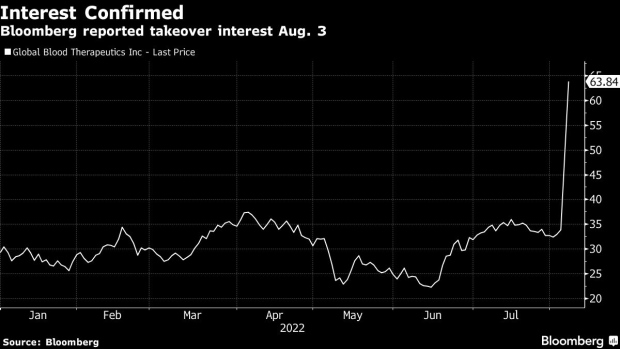Aug 8, 2022
Pfizer to Buy Global Blood Therapeutics in $5.4 Billion Deal
, Bloomberg News

(Bloomberg) -- Pfizer Inc. has agreed to buy Global Blood Therapeutics Inc., the maker of a drug for sickle-cell disease, in a deal worth $5.4 billion.
The New York drug giant will pay $68.50 for each outstanding share of Global Blood, the companies said Monday in a statement. That’s double the stock’s price on Aug. 3, when Bloomberg reported the company was drawing takeover interest. The total equity value of the deal excluding debt is about $4.6 billion, according to Bloomberg calculations.
Both boards unanimously approved the transaction. Pfizer will gain Oxbryta, South San Francisco, California-based Global Blood’s therapy for sickle-cell disease that sold about $195 million last year and the companies see as a potential blockbuster. Pfizer needs new products as concerns about the pandemic wane, threatening revenue from its top-selling Covid-19 vaccine and its pill to treat the disease, Paxlovid.
Pfizer has targeted the addition of $25 billion of risk-adjusted revenue by 2030 through business development, according to Aamir Malik, Pfizer’s chief business innovation officer. He called the deal “a very clear part of the strategy that addresses some of the loss of exclusivity dynamics in the business in the back half of the decade.”
Wall Street expects “GBT sickle-cell disease-therapy sales of around $1 billion in 2026, which will boost Pfizer’s rare-disease business,” Bloomberg Intelligence analysts John Murphy and Sam Fazeli said in a note.
Global Blood shares rose 4.6% at 10:40 a.m. in New York on Monday, while Pfizer’s increased 0.3%.
Sickle-cell disease is a painful and sometimes life-threatening condition that disproportionately affects Black and African-American people, occurring in about 1 of 365 births, according to the Centers for Disease Control and Prevention.
“Globally, there are about 4.5 million people that are living with sickle-cell disease,” Malik said. But the drug is “probably only getting to 10% of the 100,000 eligible patients in the US.”
Pfizer is well-equipped to tap that market opportunity through worldwide advocacy and reimbursement capabilities it has built up for its rare-disease portfolio, including in hematology, Malik said. Global Blood’s drug was approved in the US in November 2019 and has also been cleared in the EU and other countries.
Cantor Fitzgerald analyst Louise Chen said in a note that the deal will appease investors who have wanted Pfizer to “continue to bring in new assets to improve earnings visibility beyond the end of the decade when key assets start to lose their patent protection, and for the company to diversify its sales concentration in Covid drugs.”
Malik said Wall Street should expect Pfizer to clinch additional deals with the cash it now has on hand following its pandemic successes.
“We’re not out bargain-hunting for deals for the sake of doing deals, and we’re not letting the valuation cycles determine our approach,” Malik said.
(Updates with executive comment starting in fourth paragraph)
©2022 Bloomberg L.P.


